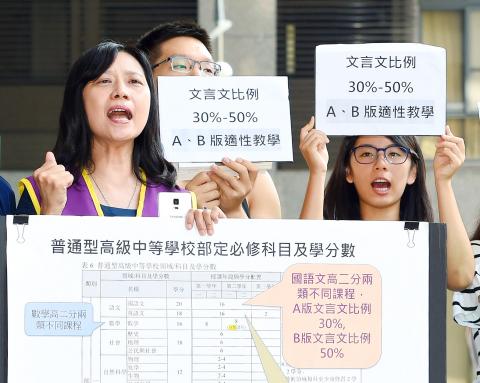A proposal by the curriculum review committee to reduce the proportion of classical Chinese content in high-school Chinese-language curricula to between 45 and 55 percent is to be upheld, Ministry of Education K-12 Education Administration Division head Chiu Chien-kuo (邱乾國) said yesterday.
A subcommittee had proposed a reduction to about 30 percent, but a meeting on the curriculum issue held by the ministry yesterday voted to maintain the original proposal by the committee, which is overseen by the National Academy for Educational Research.
Several other proposals were brought up during the meeting, including the complete elimination of classical Chinese from the curriculum guidelines to hand the decision to teachers, keeping the percentage at 40 to 50 percent, keeping it at 30 to 40 percent, and setting it at 30 percent, Chiu said.

Photo: Liao Chen-huei, Taipei Time
As no consensus could be reached, the meeting opted to go back to the original proposal of 45 to 55 percent, Chiu added.
The proposed change, which is expected to take effect in 2019, has elicited heated reactions from educators and the public, with many disagreeing about the importance of classical Chinese in modern Taiwanese education.
Yesterday’s meeting was attended by 45 of the 48 committee members who discussed eight curriculum changes. The classical Chinese issue was the seventh and most highly contentious of the issues discussed.
Outside the venue, student representative Hsiao Chu-chun (蕭竹均) spoke on behalf of student groups in Kaohsiung, Hsinchu and Changhua who are not content with the curricula.
The groups said that rote memorization of classical poetry — which accounts for 75 percent of high-school Chinese-language classwork and 90 percent of the literature portion of high-school entrance exams — fails to help students understand the significance of the poems while excluding other forms of literature.
Students said they are pressured to read modern texts on their own, given the pace of the classes and the focus on classical literature.
They supported a reduction to about 30 percent and called on the ministry to introduce more Taiwanese literature into the curriculum.
Meanwhile, members of groups including the National Education Action Alliance, the Taiwan Association for the Development of Adaptive Education, the Nationwide Twelve-Year National Education Parents’ Alliance and the Taiwan Early Childhood Education Association also protested outside the meeting venue, calling for implementation of split curricula allowing students to choose either an English-heavy or a classical Chinese-heavy course load.
The classical Chinese path would maintain current curricula while the English stream would reduce the ratio of classical Chinese texts to 30 percent, they said.

South Korean K-pop girl group Blackpink are to make Kaohsiung the first stop on their Asia tour when they perform at Kaohsiung National Stadium on Oct. 18 and 19, the event organizer said yesterday. The upcoming performances will also make Blackpink the first girl group ever to perform twice at the stadium. It will be the group’s third visit to Taiwan to stage a concert. The last time Blackpink held a concert in the city was in March 2023. Their first concert in Taiwan was on March 3, 2019, at NTSU Arena (Linkou Arena). The group’s 2022-2023 “Born Pink” tour set a

CPBL players, cheerleaders and officials pose at a news conference in Taipei yesterday announcing the upcoming All-Star Game. This year’s CPBL All-Star Weekend is to be held at the Taipei Dome on July 19 and 20.

The Taiwan High Court yesterday upheld a lower court’s decision that ruled in favor of former president Tsai Ing-wen (蔡英文) regarding the legitimacy of her doctoral degree. The issue surrounding Tsai’s academic credentials was raised by former political talk show host Dennis Peng (彭文正) in a Facebook post in June 2019, when Tsai was seeking re-election. Peng has repeatedly accused Tsai of never completing her doctoral dissertation to get a doctoral degree in law from the London School of Economics and Political Science (LSE) in 1984. He subsequently filed a declaratory action charging that

The Hualien Branch of the High Court today sentenced the main suspect in the 2021 fatal derailment of the Taroko Express to 12 years and six months in jail in the second trial of the suspect for his role in Taiwan’s deadliest train crash. Lee Yi-hsiang (李義祥), the driver of a crane truck that fell onto the tracks and which the the Taiwan Railways Administration's (TRA) train crashed into in an accident that killed 49 people and injured 200, was sentenced to seven years and 10 months in the first trial by the Hualien District Court in 2022. Hoa Van Hao, a